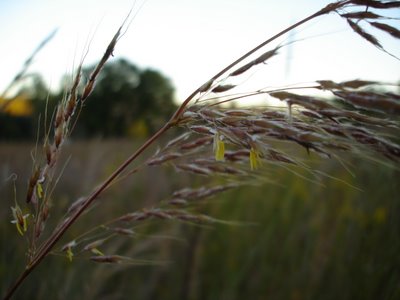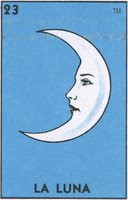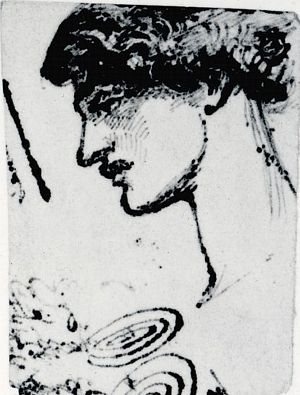The concatenation continues.

Tonight is one of those nights: I feel as though I could sit here at this wooden ship of a desk and pilot my way through an archipelago of hours. I could be here when the sun comes glinting at the eastern window, just as I was here when the sun went winking at the west. For the first time in months, if not longer, I'm pulling together a fairly large-scale piece of writing that is both creative and critical, both professional and amateur, both a work obligation and a labor of love. It is teacherly work, and I am in love with the very process of it. It is also theatrical work, and I am in love with the very thought of performing it. Whether or not I will actually indulge in an all-nighter (we are on break, after all) is another thing. But somehow, it feels as though this might not be a bad time for it, depending on how moved I'm feeling in another couple of hours.
Today has been my father's birthday, but I'd be thinking about him while doing tonight's writing in any case, because the lecture I'm developing is about learning how to be creative in the world, and he's a big part of the reason I know how to say what I want to say. Another big part is, of course, my mother; wish them a happy wedding anniversary, if you're so inclined, since they're celebrating thirty-six years tomorrow.
(Huzzah!)
Rather than tell you more about the lecture, I'm going to offer you some of the fragments that are clamoring to get into it. But first, for sheer absurdity's sake (not least because a friend's got me thinking about surrealism this week), please note the found poem I discovered in tonight's Sitemeter record of search words that have brought people to the Cabinet:
trespass acrylic hatsIt's a veritable treasure trove of strangeness. "Peristerophobia," weirdly enough, is the single word most commonly leading people along to this site, though variations on "Dr. Boom Lightning Rods" are, collectively, at the top of the list, right up there with variations on "qui sas" lyrics. I have to wonder about "anapests dactyls whitman 'song of myself,'" because in the past day I've gotten two hits from the same state--though not the same school--for that very sequence of words. Are the students of Michigan all writing essays on Whitman's meter right now? And are they all, ahem, flocking to blogs? I almost feel as though I should write an authoritative-sounding post full of nonsense; if I could feel even reasonably sure that such a thing would teach anyone a useful lesson, I'd do it. (Don't go around plagiarizing, is all I'll say here. It's a waste of everyone's time. Actually read Whitman yourself. You might enjoy him. An anapest is two unstressed syllables followed by a stressed; a dactyl is one stressed followed by two unstressed. Go do some thinking.)
amish iron bell clapper
"hello whoever you are" "whitman"
elizabeth barrett elope "father's line"
roygbiv puzzle donkey answer
anapests dactyls whitman "song of myself"
Speaking of doing some thinking:
The words I've been constellating today: transcend; collage; attention/attend/attentive; collect; intimate; love; amateur; rapt; album; nest.
Fierce wandering: my beloved.
Even junk e-mail plays along: "Fix your situation Hannah," said one spam message today. "electricity and shore up the precarious sections.... Tomb 5 is a completely different story."
 La Luna, from La Lotería, and suddenly I'm angry all over again that someone stole my La Luna t-shirt thirteen years ago.
La Luna, from La Lotería, and suddenly I'm angry all over again that someone stole my La Luna t-shirt thirteen years ago."Fear of making mistakes can itself become a huge mistake, one that prevents you from living," Rebecca Solnit writes in A Field Guide to Getting Lost, "for life is risky and anything less is already loss."
One of my dear colleagues found me a bird's empty, fallen nest outside the officehouse this afternoon. It is now on my Shelf of Finds.
Elaine Scarry theorizes beauty, and I want to believe her: "Something beautiful fills the mind yet invites the search for something beyond itself, something larger or something of the same scale with which it needs to be brought into relation.... [Beauty] comes to us, with no work of our own; then leaves us prepared to undergo a giant labor.... It is as though beautiful things have been placed here and there throughout the world to serve as small wake-up calls to perception, spurring lapsed alertness back to its most acute level. Through its beauty, the world continually recommits us to a rigorous standard of perceptual care" (On Beauty and Being Just 29, 53, 81). Is she right that "beauty is a call" (109)? I think so. Is she right to argue that "[a]t the moment we see something beautiful, we undergo a radical decentering" (111)? I want to believe. But belief, here, requires some degree of faith in humanity that I'm suddenly afraid I don't have.
I turn back to Annie Dillard, all these months later, all these years after first reading. She catches the problem that beauty might simply be missed--that the transaction Scarry identifies as one basis of moral life might simply not happen, not least because it's difficult sometimes: "This looking business is risky" (Pilgrim at Tinker Creek 23). She exhorts her readers to show up, in a moment I plan to invoke in the lecture: "[B]eauty and grace are performed whether or not we will or sense them. The least we can do is try to be there" (8).
And what does this have to do with quilting? With charms? Charm: another word in the constellation. As also perceive. And what is it to deliver a love lecture. And what is it to sit here with tiny sheets of paper proliferate. To make a verb describe. To quarry a thought by papering a desk. To be doing this work of piecing and cobbling and crafting again. To reveal what parts of "the secret constellations of [my] irrecoverable past" (Solnit 186).
And what of the moon?
To redefine amateur for one's audience, to strip back the pejorative connotation, to throw the very word into the breach, to defy trajectories that stunt and maim. One who loves or is fond of. The agent who loves.
"I am no amateur of these melons," comes a Mrs. Atkinson's Tartar Steppes to say, for the OED's 1863 example.
Nesting, shaping, feathering: the work of picking things and packing them goes on.
I believe that I have forgotten to mention what I learned two nights ago about my birth: I arrived only thirty minutes before a full moon rose. Nothing has made more sense to me in years.
Hopkins, as always. "Hurrahing in Harvest" (1877), the autumnal world "barbarous in beauty" (l. 1), the speaker enraptured by beauty, by landscape, by divinity:
These things, these things were here and but the beholderAnd I, I here, I sit here, but I also, as always, "wálk, I líft up, Í lift úp heart, éyes" (l. 5).
Wánting; whích two whén they ónce méet,
The heart rears wings bold and bolder
And hurls for him, O half hurls earth for him off under his feet.(ll. 11-14)
They will see only me, but a multitude will be speaking.


0 Comments:
Post a Comment
<< Home